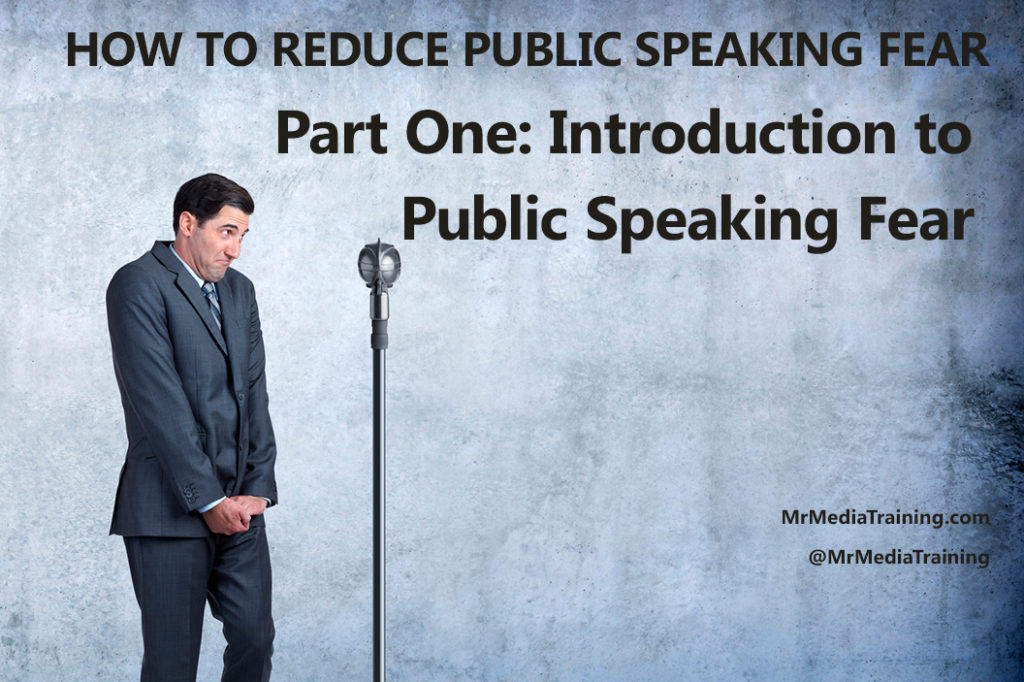An Introduction to Public Speaking Fear
This is the first post in a five-part series that will help you manage and reduce your fear of public speaking.
If you’ve experienced public speaking anxiety, you’re far from alone. A 2001 Gallup poll found that 40 percent of Americans reported a fear of public speaking. But those numbers don’t tell the full story: most people’s public speaking anxiety is normal and, in many cases, helpful.
Jeremy Jamieson, an assistant professor of psychology at the University of Rochester, says it’s problematic to view all stress as bad when, in fact, it can pump us up for a major speech. “Those feelings just mean that our body is preparing to address a demanding situation. The body is marshaling resources, pumping more blood to our major muscle groups, and delivering more oxygen to our brains.”
The key, of course, is balance. Too much anxiety can be paralyzing, but too little can be flattening. A 2013 paper published in the Journal of Experimental Psychology by Alison Wood Brooks of the Harvard Business School reports that “very low or high levels of anxiety are harmful, but moderate levels of anxiety may improve motivation on tasks that demand stamina or persistence.”

Given that anxiety is a common and frequently useful response, your goal shouldn’t be to eliminate your fear of public speaking. Reducing and managing anxiety are more realistic and productive goals that will help you feel more comfortable and prevent your body language from “leaking” distress signals to your audience that you didn’t intend to communicate.
Viewing anxiety in this context allows you to think about the physical symptoms of stress differently. You may still have an increased heart rate, sweaty brow or underarms, or feelings of shakiness—but rather than regarding them with dread, you can greet them as familiar friends that make you better. Many of our clients report giving stronger presentations when they enter the room with a few nerves than when they’re overly confident; I know that’s the case for me.
Once you reframe speaking anxiety as a normal stress response, you can stop thinking of it as a personality or character flaw and start seeing it as an evolutionary advantage. Anxious feelings are caused, in part, by your body’s natural “fight or flight” response, a vital defense system that helped to protect our ancestors for millennia and has been experienced by millions (probably billions) of people through time. Your fear doesn’t make you stand out nearly as much as you might think it does. It does, however, identify you as human.
Still, it can be uncomfortable when you think an audience can detect your anxiety. That self-awareness makes many speakers feel vulnerable or worry that their fear will undermine their credibility. Worse, it can accelerate a negative cycle as speakers convince themselves that their audiences are secretly judging their anxiety, making them even more nervous. I can offer some reassurance on those points from experience.
I’ve worked with hundreds of speakers who have confessed after a practice speech that they were nervous wrecks. I’m often shocked by their admission, as are the other people in the room, because we were all unable to spot any symptoms. The speakers are astounded when they receive that feedback—How could you not have heard my heart beating through my chest and my quivering voice?!?—but we couldn’t.
In other cases, we can detect their nerves (if you’re unsure which camp you fall into, ask a few people in the audience after your next presentation whether they were able to detect your nerves and, if they were, whether they detracted from your effectiveness). The good news for those speakers is that their butterflies typically don’t last long.
One study conducted by Texas Christian University professors Chris Sawyer and Ralph Behnke found that speaking-related anxiety peaks for most speakers immediately before their speech begins and recedes after the first minute or so of talking. But even if audiences do spot some anxiety, it often comes across as a sign that the presenter cares deeply about their talk and wants to get it right. We can tell they’re trying to succeed—and with the exception of unusually challenging audiences—most audiences want them to.
Less frequently, we witness something more profound, such as a panic attack. This blog series is not intended to be a replacement for medical or therapeutic remedies that can help address the most serious cases of fear, but should serve as a useful complement to them.
There are myriad causes of speaking anxiety and, as a consequence, there are many different strategies and exercises for managing it. In the four blog posts that follow, you’ll find several anxiety-reduction strategies. Some of them will resonate with you more than others; begin with those and set the others aside.
As you read those posts, it will help if you have a greater understanding of the sources of your own public speaking anxiety. Below are the most common causes of speaking fear I’ve witnessed throughout my career. Take a moment to see which ones strike a chord with you:
- You’ve received critical feedback from a parent or teacher
- You feel scarred from a previous presentation that didn’t go well
- A boss or coach offered you well-intentioned but ultimately counterproductive feedback that buried your natural self and most engaging qualities
- You have or had a speech impediment, such as a stutter or lisp, that led to teasing by peers
- You’re uncomfortable with or embarrassed by something related to your physical appearance or manner of speaking
- You have a self-imposed expectation of perfection
- You’ve wrapped your sense of self-worth too closely around the effectiveness of a single presentation
- You are aware of the gaps in your knowledge and are terrified the audience will see through you
- You have a general predisposition to stress and anxiety
Our Fear of Public Speaking Series
Part One: This Post
Part Two: The Public Speaking Mind-Body Connection
Part Three: Two Techniques to Reduce Speaking Fear
Part Four: Four More Techniques to Reduce Speaking Fear
Part Five: Physical Exercises That Reduce Speaking Fear



